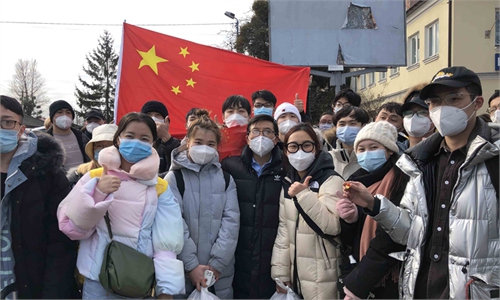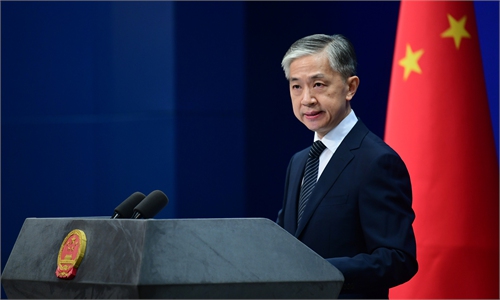Mission of hope: China's toughest evacuation concludes perfectly, showing the country's resolve, mobility and cohesion amid crisis
Mission of hope
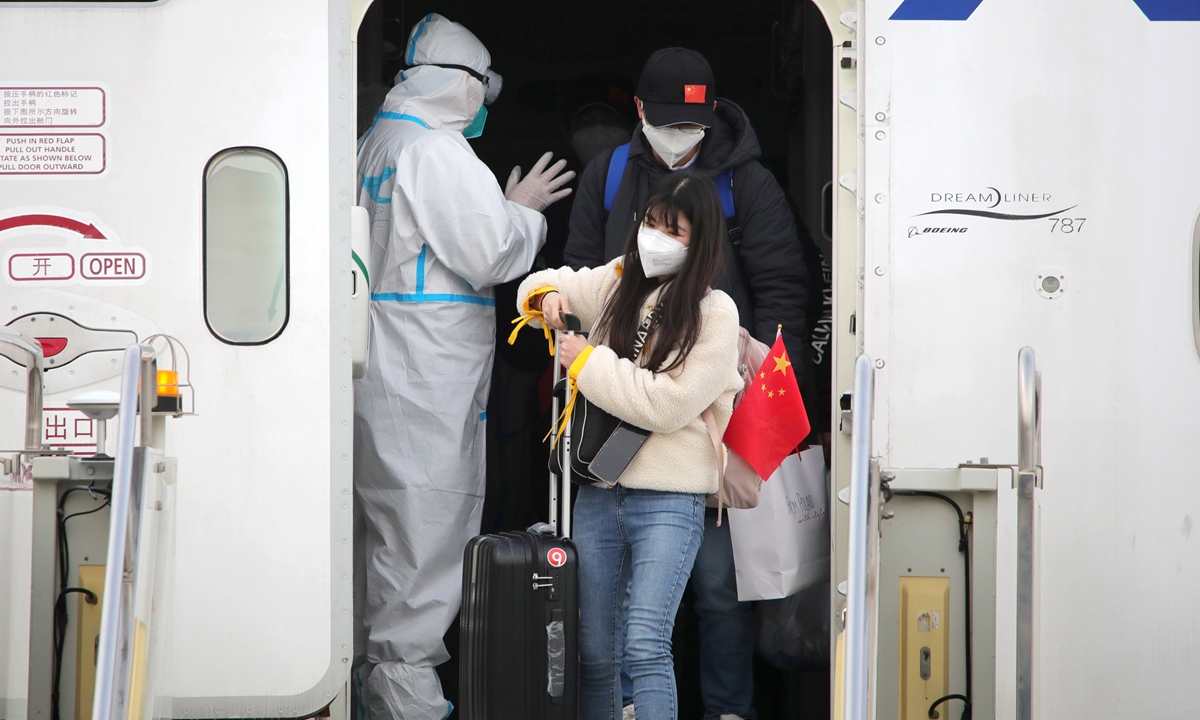
On March 9, the seventh temporary flight to pick up Chinese nationals evacuated from Ukraine arrives safely in Lanzhou, Northwest China's Gansu Province. Photo: Xinhua
"It was the first time that many of us had ever witnessed gunfire, our first time hiding in bomb shelters, and our first time fleeing a country while surmounting so many difficulties," said Dong Hao, a Chinese student among the last batch of Chinese nationals evacuated from eastern Ukrainian citye Sumy after he finally arrived in Lviv and was warmly received by Chinese Ambassador to Ukraine Fan Xianrong and fellow embassy staff."This largest evacuation in Chinese history had to contend with an incredibly complex and dangerous environment and an equally difficult operation. It involved a vulnerable group, and had the most Chinese embassies and consulates coordinating in joint efforts," Fan told the Global Times.
Since the sharp escalation of tensions in Ukraine, the Chinese Foreign Ministry quickly launched the consular protection emergency mechanism to organize, guide, and coordinate Chinese citizens to avoid risks and successfully evacuate. Over 5,200 Chinese citizens were safely evacuated to Ukraine's neighboring countries.
In the past several weeks, the Global Times reporters have stayed in contact with the Chinese embassies and consulates in Ukraine, Romania, Poland, and other countries, and interviewed several individuals including students and organizations, recording all aspects and points of this miraculous operation panoramically.
In this miraculously successful operation, countless moving episodes of Chinese embassies, consulates, student associations, chambers of commerce, as well as Chinese compatriots helping each other tell the story of national unity. These unique experiences have converged to declare that "In times of adversity, we have only one name: the Chinese."
'Mission Impossible'
"While everyone was immersed in the celebration of the Beijing 2022 Winter Olympics and sharing the lovable mascot Bing Dwen Dwen, they would never have anticipated that a war could be so close at hand…" Dong, a Chinese student majoring in culture and arts at the National Pedagogical University of Sumy, Ukraine, told the Global Times, recalling his past few weeks of ordeal after he was finally repatriated from the war-struck country among the last batch of Chinese students who were evacuated.
"Dozens of people crowded inside a small shelter, sitting on the floor. We could not eat or sleep, and there was no bathroom or internet. The only thing we could do was stare at the dark ceiling, praying for the war to end soon," he said.
Dong was among the last 100 students to be evacuated from danger zones under the organization of the Chinese Embassy in Ukraine.
During an exclusive interview with Ambassador Fan, the Global Times learned that of the 6,000 Chinese nationals in Ukraine, over 5,000 were evacuated under the coordination of the Chinese Embassy in Ukraine.
"Under such tense environments in Ukraine, all of them are safe and sound except for one who got injured and was treated." Fan said. "Bullets have no eyes, but our efforts and the love and unity among our compatriots safeguarded the evacuation."
This "mission impossible" started on February 24. Within one hour after the first Russian bomb went off in Ukraine, the Chinese Embassy issued the very first security warning, all while launching an emergency response mechanism in no time.
An embassy staffer in charge of consular protection told the Global Times that their work could be summarized into five aspects: Issuing security warnings, assuring and consoling the worried, organizing the evacuation, organizing local Chinese associations, and coordinating with Chinese embassies in neighboring countries over immigration procedures.
"Given the situation in Ukraine, the first thing we needed to do was to assure all Chinese nationals and ease their anxiety. We increased our contacts with them to learn about their needs and make sure they were able to contact the embassy at any time," the embassy staffer told the Global Times on condition of anonymity.
They set up three 24/7 consular protection hotlines - the usual consular protection line, a specific line for overseas students, and the third one for Chinese enterprises and associations. With only a few dozen staffers at the Chinese Embassy in Ukraine, they managed to take over 1,000 calls a day on average.
"Calls weren't only coming from the Chinese nationals in Ukraine at the time. Their families and friends back in China would also call us, so we talked with them round the clock through many sleepless nights," the embassy staffer said.
For Chinese nationals in the country who did not speak Ukrainian, the embassy also set up a number of WeChat groups and published notices on the embassy's official website to inform fellow citizens of safety reminders and precautions in a timely manner.
With the Russia-Ukraine conflict intensified and the security situation in Ukraine deteriorating rapidly, a large-scale evacuation plan was officially put on the agenda. However, "how to evacuate them" became the most challenging task for Chinese diplomats to complete.
First, they thought about whether to adopt the original plan of chartering flights. There would be no problem with China arranging for flights but the situation in Ukraine did not guarantee the absolute safety of Chinese nationals.
They considered evacuation by sea as well by congregating all Chinese nationals to the southern Ukrainian city of Odesa. That involved additional risks to the already dangerous situation and the urgent need for ships made the plan unviable.
Ultimately, only one option was viable - evacuation by road. After careful consideration, the embassy finally made a decision: To transport people by bus from Kiev, Sumy, and other Ukrainian cities to the border cities of Lviv and Odesa. Then there would be an onward journey across the border to Poland, Moldova, Slovakia, Romania, and other neighboring countries via two railway lines and finally repatriation via air using charter flights.
The first 600 Chinese nationals were evacuated from Ukraine on February 28, five days after the war broke out.
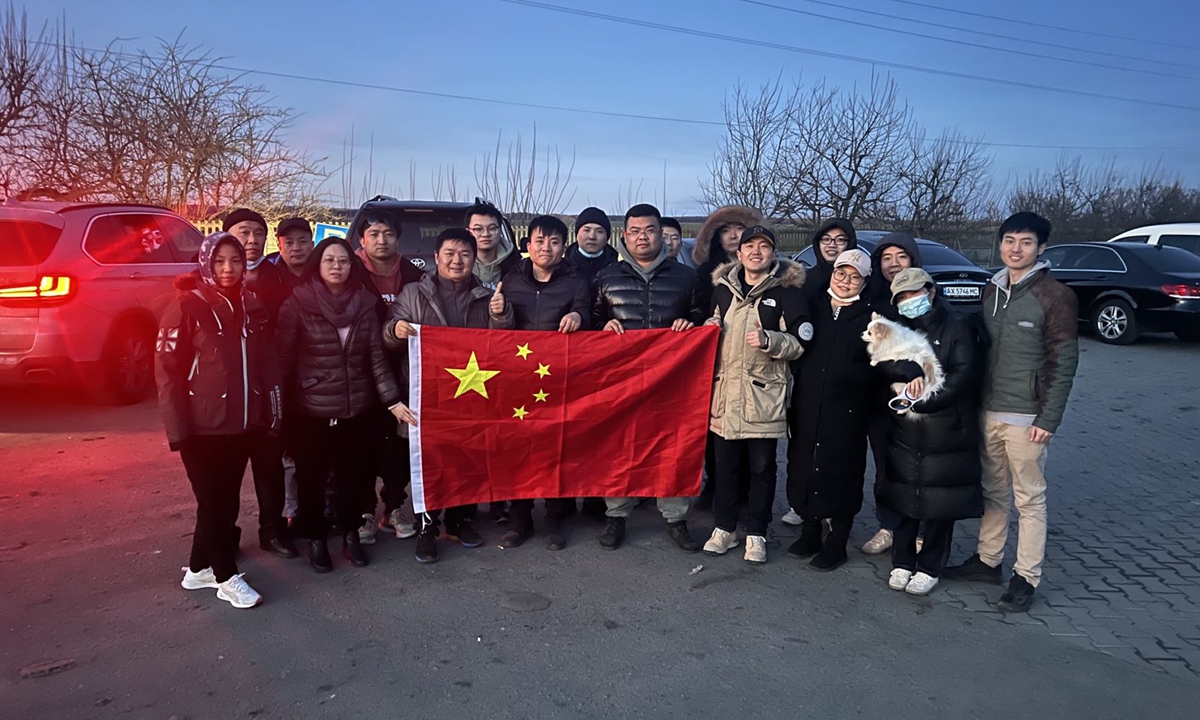
The first batch of Chinese nationals pose for a photo with Chinese national flag after safely evacuating from Kiec to western Ukraine on February 28. Photo: Courtesy of the Chinese Embassy in Ukrain
The largest-scale evacuation operation took place on March 1, when 1,700 Chinese nationals got on the buses and left for neighboring countries under the arrangements made by the Chinese Embassy in Kiev and the Consulate General in Odesa.They also liaised with local Ukrainian government departments to appoint police cars to escort the convoy. "They were a big help in ensuring the safety of Chinese nationals, as there were many gangs of local armed militias along the wayvrobbing people. With buses being such an obvious target, police escorts played a big role in ensuring safety," a consular staffer told the Global Times.
Even so, they encountered countless moments when their lives were only hanging by a thread. Three bombs went off near the buses in less than an hour after the first buses with evacuees onboard set off, going through at least 15 checkpoints manned by armed soldiers, an embassy staffer escorting the students' convoy told the Global Times.
The checkpoint soldiers once confiscated six smartphones from a group of Chinese evacuees. As the students recall, they said they could understand that soldiers feared that some pictures and videos circulating online would lead to more casualties.
'They haven't given up on us'
The most difficult task of all was evacuating the last batch of 100 students from Ukraine's Sumy city, which borders Russia in the east and north and was besieged by both Russian and Ukrainian military forces from the second day after the war had broken out.
Students trapped in the region first began studying the plan which entailed fleeing to a city only 70 kilometers from the Russian border. They conveyed this plan to the embassy but got rejected for the reason that it could pose huge security risks. A number of other plans were then formulated but none could ensure the safety of their evacuation and were scrapped eventually.
"On March 6, we received some good news, as we were notified to immediately assemble and depart. All of us were so excited and we rushed to pack our bags," Dong told the Global Times. "But in the midst of war, things are not meant to be that easy. The Ukraine and Russian sides did not reach an agreement, so the plan was once again dropped."
"The next day, the huge roar of bombers sounded over our heads again, and in less than a minute, bombs landed on the street where our dormitory was located. The moment when the mushroom cloud rose, we thought that we would never be able to leave," Dong recalled.
Finally, things began to look up. They were told to leave in the early morning of March 8, and a green channel was opened for their evacuation. "Under the arrangement made by the embassy, we were the first batch to leave on that day. Unfortunately, the second group was not able to leave as military operations started once again," Dong said.
"It was not until days later that we learned that in order to get us out, the embassy staff and the ambassador did not sleep for four days and nights, talking with the deputy prime minister of Ukraine nonstop over the matter. They really hadn't given up on any one of us," Dong said emotionally. "As we finally arrived in Lviv and saw the embassy staff welcoming us with the Chinese national flag and banner reading 'Kids, your motherland welcomes you home,' we couldn't stop crying."
'Life Relay'
The smooth evacuation of Chinese nationals from Ukraine could not have been realized without the collective efforts of Chinese embassies and consulates in neighboring countries. Ambassador Fan noted that they coordinated with fellow diplomats from 10 other Chinese embassies and consulates, and "under joint efforts, we sent back one person after another in a relay, which is a reflection of the strength of our country."
The Global Times learned from the Chinese Embassy in Romania that after the evacuation began, staff members in the embassy immediately activated an emergency response mechanism, mobilizing all members to participate in the operation and formulated a detailed contingency plan in case of emergencies.
The Chinese Embassy in Romania quickly established several teams in charge of coordination, communication, and logistical support and dispatched several groups to airports and land ports. Jiang Yu, the Chinese Ambassador to Romania, took the initiative and contacted the Romanian Ministries of Foreign Affairs and Interior, the police, border defense, civil aviation, and other departments and quickly received strong support via flight approval from Romania and a security guarantee.
It was freezing in Romania in February. Facing biting wind and heavy snow, staff at the embassy went to two ports bordering Moldova, which are 300 and 500 kilometers away from the capital Bucharest, to make sure that the Chinese nationals would be able to see the embassy staff immediately upon arrival when they entered customs, calming their anxiety and fear all the way.
On March 1, 518 Chinese nationals entered Romania through the two ports and arrived in Bucharest by bus as organized by the Chinese Embassy in Romania, marking the smooth opening and safe operation of the channels for people transiting from Ukraine to Romania. Since that day, as of March 20, more than 3,500 Chinese nationals entered Romania directly or via Moldova from Ukraine, of which more than 2,400 entered Romania within just three days from March 1 to 3.
At the Chinese Embassy in Poland, a staff member told the Global Times that they received an order from Beijing regarding the evacuation and on the same day, two contingents from the embassy drove out to eight land ports between Ukraine and Poland from south to north, and vice versa, in order to confirm whether the ports functioned normally.
"We need to make sure that Chinese nationals could pass through the ports smoothly, with or without visas, as long as they hold Chinese passports, " the embassy staff said on condition of anonymity.
Since March 1, members from the Chinese business community in Poland spontaneously set up 10 points for assisting their Chinese compatriots, which had played an important role in assisting the evacuation. "In fact, there are not many Chinese nationals living on the borders of Ukraine and Poland, but all of them were mobilized to drive to the land ports picking up Chinese people evacuated from Ukraine," he said.
Smoothly receiving Chinese nationals was only the first step. How to relieve them from worry was a key task.
"Those children who were in the warzone were very vulnerable," the embassy employee said, noting that the embassy first arranged for accommodation, hot Chinese food, and daily necessities, as well as anti-epidemic personal protective equipment for them. "It was also important to tell them that as long as they could find the Chinese embassy, they could calm down and rest easy," he said.
According to the Chinese embassy in Romania, Bucharest was at capacity due to accommodating Ukrainian refugees. Faced with this difficult situation, the embassy not only fully mobilized its own resources, but also encouraged more than a dozen overseas Chinese associations, enterprises, and chambers of commerce to make every effort to book hotels as resettlement sites.
Welcome home
Putting Chinese nationals safely on home bound flights was the last and most important part of the evacuation mission. During the evacuation, a total of 9 batches of 13 temporary flights brought back 3,159 people to China from Romania, including 80 infants and a small number of foreign family members of Chinese citizens, according to the Chinese Embassy in Romania.
On March 4, the first flight with Chinese evacuees from Ukraine took off from Romania. The cabin was adorned with numerous small Chinese national flag, which deeply moved the students onboard the plane.
Gao Jin, head of Overseas Chinese Newspaper of Europe who helped receive several students from Ukraine, told the Global Times that the Chinese students who study fine arts, mechanical engineering, and architecture in Ukraine mostly come from middle-class families as the tuition fees in Ukraine are only one-third of those charged by US institutions of higher learning.
Most of the Chinese businessmen and students have now been back in China, but some had to take trains to the Ukrainian border to wait for the end of the war, because "their businesses and families are still in Ukraine and they just can't leave them behind," Gao said, noting that a large number of Chinese businessmen have been directly bankrupted as a result of the Ukraine crisis.
During the evacuation, the Chinese Embassy in Romania prepared medical-grade facial masks, disinfectants, and other epidemic prevention materials in advance, and contacted testing institutions to conduct nucleic acid tests at each settlement site. If positive cases are found, they would be sent to hospital or quarantine sites and the embassy staff would send traditional Chinese medicine Lianhua Qingwen and other medicines to them.
In response to the new requirement of rapid antigen testing before boarding, the embassy immediately sent staff to more than 20 pharmacies to purchase more than 600 reagents to meet the demand.
"It's a privilege to be part of such a major diplomatic mission for our country. If our compatriots can return home safely, it will be worth the pain and suffering we have had to endure," the staff member of the Chinese Embassy in Romania told the Global Times.
Behind the coordination of evacuation flights were the patient and collective meticulous work of countless staff: A student who had suffered a brain tumor needed to return to China for surgery, but it usually takes one day to get the local nucleic acid test results, so the embassy contacted the testing agency urgently and got the results within 3 hours after the test; some compatriots lost their passports, so the embassy urgently issued travel documents to allow them to board smoothly…
"When we finally boarded the plane and saw the red Chinese national flags hanging in the cabin, the huge stone hanging over our hearts finally fell to the ground," a Chinese business employee surnamed Li who has long been based in Ukraine told the Global Times.
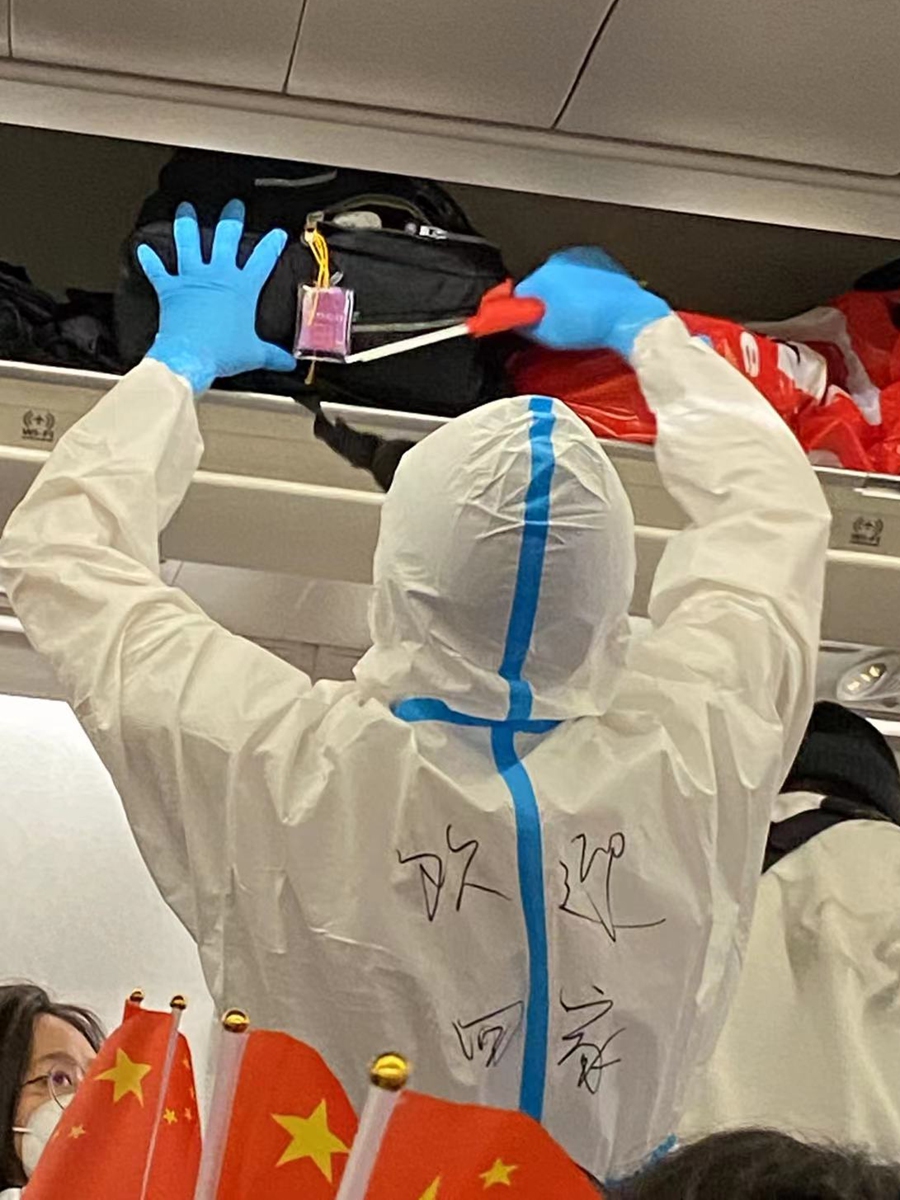
A member of the cabin crew is seen wearing a personal protective suit with the phrase "Welcome home" written on his back on a temporary flight picking up Chinese evacuees back to China. Photo: courtesy of Gao Jin, head of Overseas Chinese Newspaper of Europe.
"The captain said to us, 'The moment you step on this plane, it means that you have already stepped onto the soil of your motherland. Welcome home!' I could not speak at the moment, and I cannot describe my emotions. We began singing our national anthem in unison and applauded for all the warmth and help from everyone along the way."We have but one name: The Chinese
During the large-scale yet miraculous swift evacuation operation, there were many moving stories of Chinese compatriots helping each other out in times of need. These little moments converged to declare that "In times of adversity, we have only one name: the Chinese."
In Odesa, a student surnamed Zhou who was originally in the first batch of the evacuation list took the initiative to give his place to another and stayed behind to stand by and help with the arrangements for everyone else's evacuation. He worked until his voice was hoarse and his eyes were bloodshot, but he never complained. He and his wife and children stayed until all the evacuees had safely been sent on their way and the Zhou family left with the last groups of Chinese evacuees.
In Romania, Gao prepared food, and his newspaper's offices were used as shelter to accommodate the exhausted and starving evacuees. As Romania experiences soaring prices in food and supplies, Chinese people like Gao took in not only their compatriots, but foreign nationals as well, to give them a warm place to stay and hot food to eat, despite going through difficulties themselves.
In the land port of Moldova bordering Ukraine, the students secretly left two eggs on the bus before they waved goodbye to the embassy staffer who escorted their ride. "They must have known that I was starving too," recalled the staffer, "You may not believe it, but during times of war, these two eggs are exceedingly precious."
In Sumy, seven students who are also members of the Communist Party of China (CPC) voluntarily set up a temporary Party branch, and they played a vital role in organizing the evacuation of local students safely and in an orderly manner out of the danger zone .
"I was so surprised that the young CPC members could show such a sense of responsibility in such dire times," a staff member at the Chinese Embassy in Ukraine noted.
"During this evacuation process amid the conflict, not a single Chinese national was killed and no mass injury incidents happened," Chinese Foreign Ministry spokesperson Wang Wenbin said on Monday. Over 5,200 Chinese citizens were safely evacuated to Ukraine's neighboring countries. Except for one individual who got injured on the way and has now been cured, all Chinese compatriots were safe and sound. Over 4,600 of the evacuees have been brought back by 20 ad hoc flights arranged by the Chinese government.
Now, the evacuation work has basically come to an end, but protecting the safety and legitimate rights and interests of Chinese nationals overseas is always an abiding commitment, Wang noted.
"Looking forward, the Ministry of Foreign Affairs and the Chinese diplomatic missions abroad will continue to actively improve the consular protection mechanism and build a system for the protection of Chinese nationals and interests overseas," Wang said. "With everything we do, we will show every one of our compatriots overseas that we stand with them at all times, wherever they may be, and that their motherland will always have their back."


